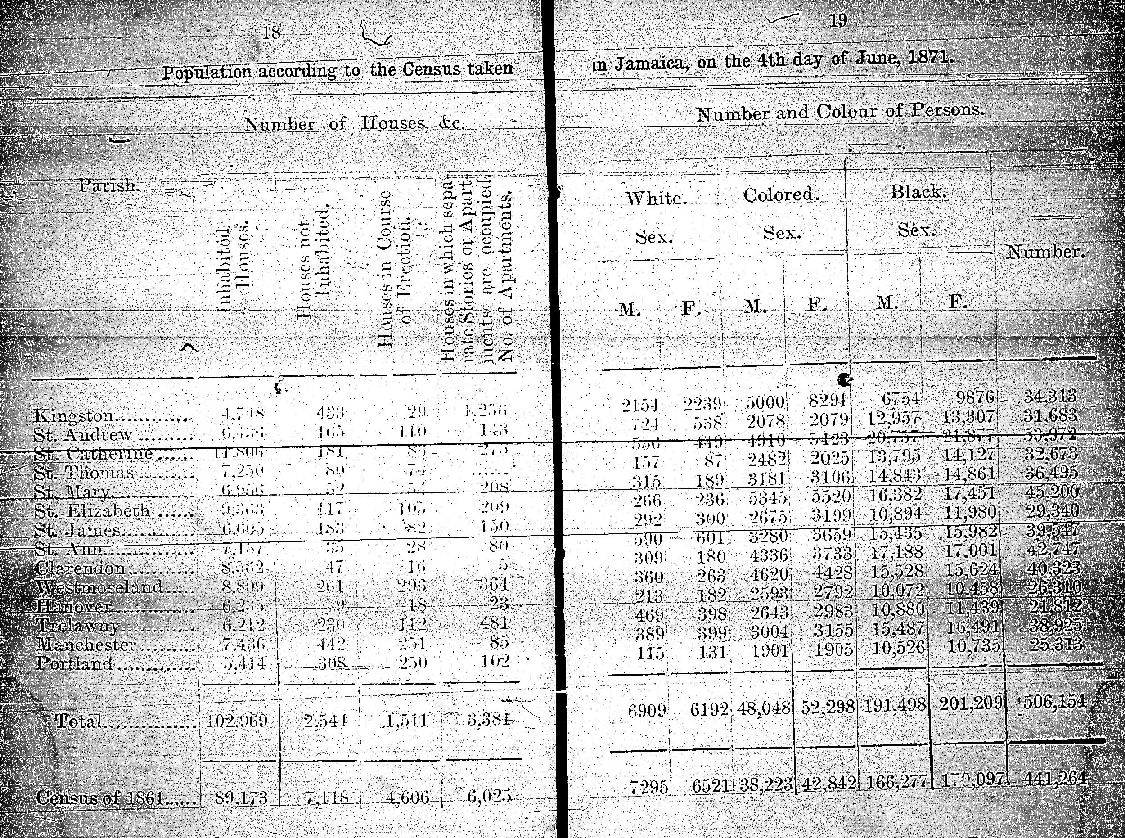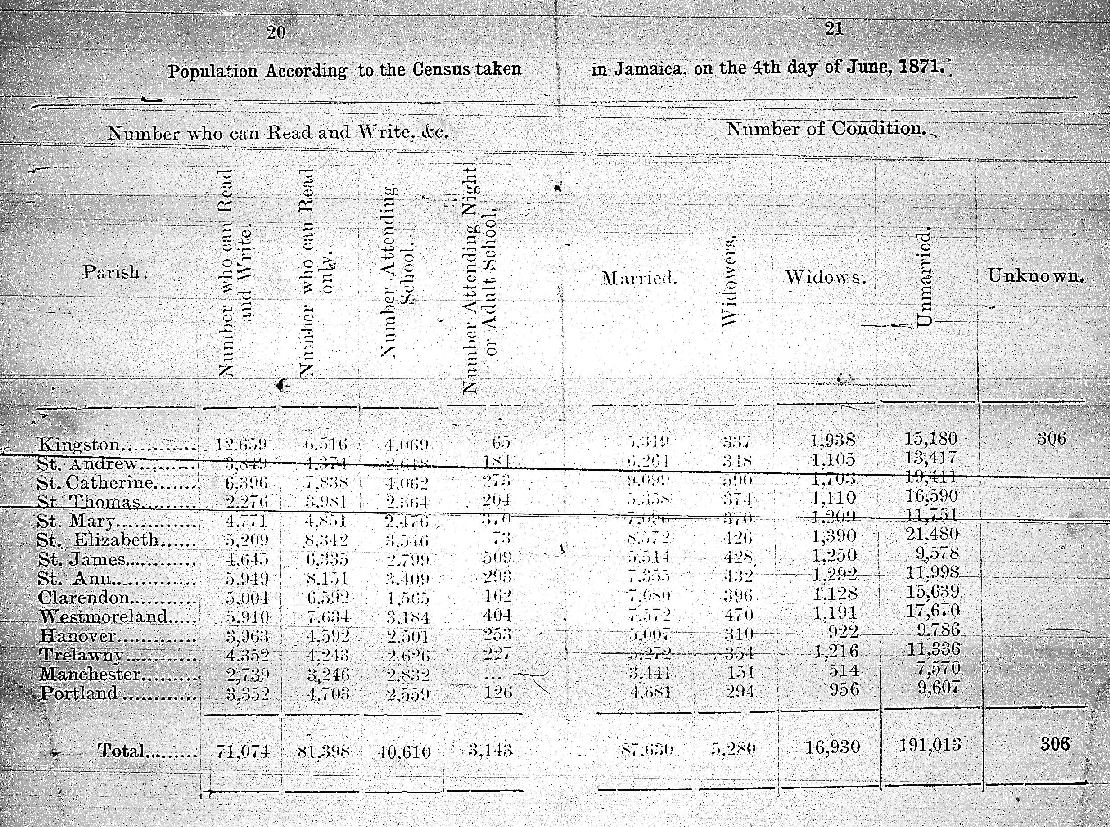
Jamaican Family Search Genealogy Research Library
1875 Jamaica Almanac
INTRODUCTION
Aboriginally Xaymaca, or Land of Wood and Water - an island situated in the Caribbean Sea, about ninety miles to the south of Cuba, within 17º 40'-18º 30' N and 76º 10'-78º 30' W. longitude. It is the largest and most valuable of the British West India islands, being 144 miles in length and 49 in extreme breadth, containing an area of 4,193 square miles, of 4,080,000 acres, and a population. at the last census of 506,154. It was discovered on the 3rd May, 1494, by Columbus, and was taken possession of and settled by the Spaniards under Don Juan de Esquimel, 1509, who landed at Santa Gloria now St. Ann `s Bay, and fixed the Seat of Government there. So great was the inhumanity of the conquerors that fifty years after their occupation of the island the native population is said to have entirely disappeared. In 1655 a British expedition, sent out by Oliver Cromwell, under Penn and Venables, attacked the island. which capitulated after a trifling resistance on the 3rd of May of the same year. After its capture until the restoration of Charles II., it remained under military jurisdiction. In December, 1663 the first General Assembly was summoned by Lt. Gov. Sir Charles Lyttleton and seventeen members were returned who met on the 20th January, 1664 and chose Robert Freeman, Speaker. In 1807, the Slave Trade was partially abolished, at which time there were about 323,827 slaves. On the total abolition in 1833, Jamaica received £6,161,927 as her portion of the £20,000,000 granted by Parliament as compensation to the slave owners. From the sea-level on all sides of Jamaica, a series of ridges gradually ascend towards the central ranges from which they radiate, dividing the large ranges and attaining, in the culminating Western Peak of the Blue Mountains an elevation of 7,860 feet. From these mountains at least 70 streams descend to the north and south shores, but, with the exception of one (the. Black River and that only for small craft) they are not navigable. Excellent harbours are everywhere to be found. After being 200 years in possession of Great Britain, under local legislation, a serious disturbance broke out in the Eastern part of the island, which caused the Assembly and Council to pass an act determining all the functions and privileges enjoyed by them, and giving power to the Queen to create a new and strong form of Government, which was promulgated on the 16th August, 1866, constituting Jamaica a Crown Colony like Mauritius. The entire authority is now vested in the Governor with a Council consisting of 6 official and 6 non-official members. Kingston is the capital and principal shipping port. After years of much commercial depression, the Colony has, under the administration of Sir John Grant, been raised to a condition of extraordinary prosperity. Estates which lay abandoned for years have either been put in cultivation by their owners, or have passed into new hands at almost fabulous prices compared with that obtained in 1866. The confidence of capitalists abroad has been so established that the Securities of the Colony are eagerly purchased at a. premium. New enterprizes are springing up everyday-new factories and new industries-and never was there a period in the history of Jamaica when the industries of the country were so roused into activity as at the present time. The area of coffee cultivation has been so increased within two years that the small coffee growers are accumulating money, which is gradually finding its way into the Government Bank. The climate is so congenial for invalids that in Winter numberless American and English families seek a tropical Winter in Jamaica. The other shipping ports are Port Morant, Morant Bay. Salt River, Black River and Savanna-la-Mar on the south side; and Lucea, Montego Bay, Falmouth, St. Ann's- Bay, Port Maria, Annotto Bay and Port Antonio on the north side.
The island is divided into three counties, viz., Middlesex, Surrey and Cornwall. These are subdivided into fourteen parishes, viz. Middlesex - St. Catherine, Clarendon. Manchester, St. Mary and St. Ann; Surrey - Kingston, St. Andrew, St. Thomas and Portland. Cornwall - St. Elizabeth, Westmoreland, Hanover, Saint James and Trelawny.
Amount of Public Revenue in 1873……………… £479,393
Expenditure, 1873…………………………………………454,197
Amount of Public Debt, 1873………………………632,776
Principal Export
Sugar, Rum, Coffee, Pimento, Ginger; Arrowroot. Logwood, Lignumvitae, Fustic and Black Ebony, Bitterwood, Tobacco. Cocoanuts, Pines, Oranges, Bananas.
Population
Whites 13,101
Coloured 100,346
Blacks 392,779
The Almanac contains statistics compiled from the 1871 Jamaican Census. (All that remains from the Census is data and statistics, as no names of persons were retained.) Totals from the households in each parish were grouped under the headings of:
Inhabited Houses
Houses not Inhabited
Houses in Course of Erection
Houses in which separate Stories or Apartments are occupied. Number of Apartments.
Number and Colour of Persons:
White
Male
Female
Colored
Male
Female
Black
Male
Female
Total
Number who can Read and Write etc.
Number who can Read and Write
Number who can Read only
Number Attending School
Number Attending Night or Adult School
Number of Condition
Married
Widowers
Widows
Unmarried
Unknown
The images of the pages that contain the numbers that were compiled are included below. The pages are very pale and difficult to read, but you may get some idea of the relative numbers.
Census images 1 & 2

Census images 3 & 4

SEARCH THIS SITE
GO TO:
Help - Frequently Asked Questions
Jamaica Almanacs Slave-owners, Civil & Military officers, Magistrates etc.
Items in the Samples Directory
Items in the Members Directory
Transcriptions from Registers and Wills (Church of England, Dissenters, Civil Registration)
Jamaican Roman Catholic Church Registers - transcriptions
Jamaican Methodist Baptisms - transcriptions
Jewish births marriages deaths - transcriptions